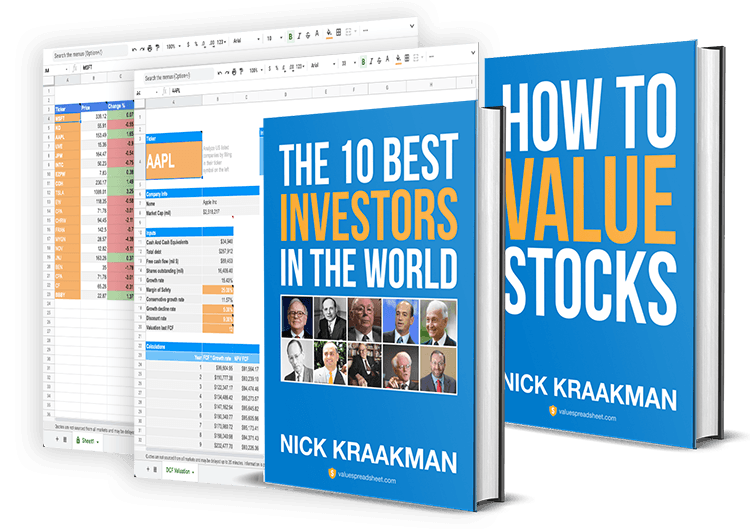Transcript
Hello, everyone!
I hope you're as excited as I am about this 11th episode of the Value Investing Bootcamp podcast.
I'm your host, Nick Kraakman, and thanks again for tuning in, listening to these podcast episodes, and I hope you're learning a lot from them.
At least I'm trying to share as much information as I possibly can with you in these relatively short episodes.
I try to jam as much information into these 10 minutes.
Today, we have a topic which is of great interest to value investors; it is about shareholder friendly management.
It is something Warren Buffett, for example, highly values.
He thinks it's really important that the management of a company should have their incentives aligned with the shareholders, that they work not to make themselves rich, but to make the shareholders rich as well, you know, so their efforts are towards creating shareholder value rather than just filling their own pockets.
And one of the ways to actually align these incentives, I mean, what do shareholders want?
They would like to see that the value of the business increases over time and that the share price moves along with it.
And what do managers want to see?
Well, they want to earn money, you know, they want a good salary, and maybe some bonuses here and there, that's all good, but the best thing is when these two are aligned.
So, for example, if you look at compensation packages for managers, which you can look up, the compensations for the board of directors and the high management functions; you can look them up on financial websites like Google Finance or Yahoo Finance.
They just list the names of the board of directors and their compensation packages, and one thing you want to be looking for is that they don't earn too much.
If they earn unrealistically high salaries, that just probably means that they are trying to fill their own pockets, and do not have shareholder value as a top priority.
Another thing you can look for is insider ownership.
In other words, what is the percentage of total stocks on the stock market for that particular company that are in the possession of insiders, so of the management of the company, for example, or its employees.
The higher this percentage, the more aligned are the interest of the shareholders and management of the company, because if insiders, if the management has a lot of stocks, so a big stake in the company, it means that if the stock price moves up, that also means that their holding, their stock holding is going up.
So, they are more inclined to steer their efforts towards creating this shareholder value, because they are shareholders themselves!
You can look this up, if you go to finance.yahoo.com, and you type in a ticker symbol, or a company name, you can scroll down in the left sidebar, you can click key statistics, and then you find-- Yeah, one of the statistics there is insider ownership.
You can also see institutional ownership, which is what percentage of total shares is owned by institutions like pension funds, etc.
Also interesting information, but we're talking about management now, of course.
So, yeah, look for insider ownership there.
And what is also interesting is that whenever a manager of a company decides to sell some of its stocks, this person has to report this to the SEC, to the Securities and Exchange Commission, so you always know when management is selling some of their shares.
This does not always mean that they think, oh, the company, the share price is going down in the next-- It's not because they know more than-- Yeah, of course, they know more than you know about the company, but the fact that they are selling is not a bad sign in itself.
I mean, maybe they just want to get some more money out and buy a new car, whatever, but just keep that in mind.
I mean, it's always newsworthy, so probably if you follow the financial news surrounding that particular company, you will probably be notified when insiders are selling or buying as well, as they have to report that as well.
So, yeah, keep this in mind, and whenever they are selling, it doesn't necessarily mean something bad is going on or they expect something bad to happen with the company, but this could be the case, of course, so always do some research whenever insiders are selling, especially when they are selling a large number of shares.
And yeah, use it as an indicator that something might be wrong, but it's not always the case. Sometimes they just want to cash out and get some money.
Another way to see if management is actually doing a good job, if it's shareholder friendly, is to look at when a company decides to do a share repurchase or a buyback program, as it’s sometimes called, which means that they purchase some of their stock back from the market so they get more ownership of their own company, again, they get back ownership.
The result of this is that less shares will be outstanding in the market, which in turn increases the earnings per share, and therefore the per share value of the company goes up.
However, buybacks are only beneficial to a company if shares are bought back at a price below their true value, below their intrinsic value.
If a company buys back shares at a price higher than its intrinsic value, it is actually not doing any good to the company, it's actually destroying more value than it creates, so always look out for that.
So, on the website valuespreadsheet.com you can get a free discounted cash flow spreadsheet.
You can use this to sort of get an estimate, rough estimate, of what the intrinsic value of a company is, and if a company is announcing a share buyback program, and they are buying back shares at a price way below that value that you estimated with the spreadsheet, for example, or with your own method, then management is doing a good job.
If this repurchase price is way above this value, or almost equal, then it's not creating much value and management is not really creating shareholder value there.
Another final thing, that some companies they earn a lot of money, but they don't really need it to-- Yeah, it sounds strange, but they don't really need all that cash themselves, so it is better in that case to buy back shares.
However, we just said if the price and value are too close together, this doesn't make sense.
So, in that case, if the company has no better way to invest that money back into its own company, yeah, it's better off just paying out a dividend to its shareholders, so the shareholders can decide themselves what they want to do with this money.
So, also look out for that, as that's just another little thing that you can use to determine whether management of a company is actually creating shareholder value.
Okay, so I hope this was interesting.
I just want to wrap it up with a quote from Seth Klarman, who is a legendary investor, he wrote the greatest investment book, which is out of print right now, it's called "Margin of Safety", and essentially, what he said about about management is this, “Don't get in bed with bad people.”
And I think that's a nice way to say it.
Just look for shareholder friendly management who know what they're doing and you'll be fine.
So, thanks for this. Thanks for listening again. Thanks for tuning in.
Next episode, we'll talk about another interesting topic, which is free cash flow.
It's a very important metric that value investors use, so be sure to check that one out and I'll see you there.
Thanks!
If you enjoyed today's show, head over to ValueInvestingBootcamp.com to find out more on how you can invest like the pros, manage your own portfolio with confidence, and consistently earn mind boggling returns on the stock market.



